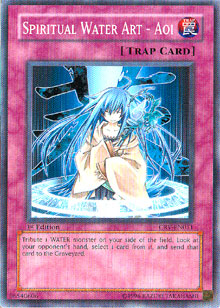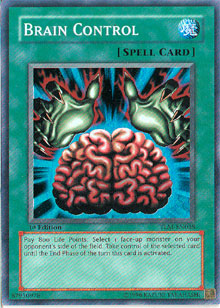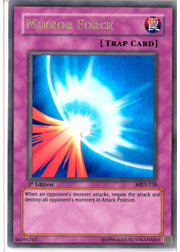There is a skill in the Yu-Gi-Oh! TCG few are blessed with, a skill which separates many players from anonymity within the community. Frankly, mastering it will make a good player into a great player. It creates plays so near to perfect you’ll almost be able to disregard any mathematic formula I’ve presented for decision making before. I’m talking about another Yu-Gi-Oh!/poker crossover: maintaining strong reads on your opponent.
In poker (at least to the experienced player), a read (most often) isn’t a "tell" as most people believe. In poker, you gain reads from betting tendencies and the justifications for the moves your opponent makes. For instance, a basic read would be an opponent making a big raise before the flop (the revealing of shared cards for the table), the flop revealing a 7, another 7, and a 2, and your opponent raising about half the pot. Your opponent would have raised with very few hands that improved given that turn of events, because it helps only the worst of hands. You can safely (almost safely—he or she could have a pair of aces or kings) assume your opponent is bluffing. This may seem like a strange concept to cross over into dueling, but you can’t imagine how annoying it is when your opponent starts trying to intimidate you by telling you what monster or trap you’ve just set. In poker, players utilize mathematics to determine their opponent’s hand or reads (one is safer, and one, if correct, is more powerful). I’ve already taught you how to use math to help predict your opponent’s cards, but now we’ll discuss using reads.
First, I’ll tell you how to use it against your opponent. Recently, I wrote an article entitled "Making the Perfect Move," which discussed a mathematic formula for determining cards your opponent hasn’t revealed yet. This is a very powerful approach to the game, and I recommend it if you are unable to utilize reads in the situation (or if this approach is too difficult for you at your current play level). Consider the original evil of the Yu-Gi-Oh! television series. Pegasus was able to see what cards his opponents were playing and devise the perfect play to counter them. What if I were to tell you that I am able to do that, and that you can learn to do it too?
Just a week ago at a local tournament, I was playing a match against someone whose tactics I know. (Always stockpile information about your opponents: their favorite cards, whether they play aggressively or conservatively, what decks they play, etc. It is all useful information.) Before I started traveling to Shonen Jump Championships, I found Metagame.com an extremely useful tool to study opponents who I’ve never played before. When I finally went to a Shonen Jump and played against Paul Levitin, I already knew he was an aggressive player who used trump cards in his decks. I played accordingly.
 This week, I was playing an Advanced version of my Spiritual Water Art - Aoi deck. Now, seeing your opponent’s hand makes reads quite a bit easier, but I hadn’t activated one yet this game and had no knowledge (other than that attained through reads) of my opponent’s hand.
This week, I was playing an Advanced version of my Spiritual Water Art - Aoi deck. Now, seeing your opponent’s hand makes reads quite a bit easier, but I hadn’t activated one yet this game and had no knowledge (other than that attained through reads) of my opponent’s hand.
This was the situation of the game:
I had one Monarch on the field and my opponent was running a Monarch deck. It was game 2 and he had activated two copies of Soul Exchange in the first game. My opponent had Treeborn Frog in the graveyard, but ended his previous turn without playing anything, despite having two cards in his hand. His field was open and he had 4000 life points left. I had five cards in hand with Mirror Force in my back row, but only 2000 life points left. I had just attacked and brought my opponent to 4000, then ended my turn.
My opponent drew his card, set the two cards in his hand into the back row, and set his newly drawn card in face-down defense position. (He didn’t shuffle his hand. Remember—always shuffle your hand, or you’ll be giving savvy players free information, which is never good!) He ended his turn. I had reached what we call in poker an "inflection point." My low life point count meant I had to be more meticulous with my moves while maintaining a strong aggression. If I let my opponent play a Monarch, it could mean the end of the duel!
At this point, I was forced to utilize my reads. This was, after all, probably the most important turn of the game. With both of us so low in life points, I couldn’t make a mistake. Face-down defense position monsters often have disastrous effects on a player who is trying not to overextend. (Mirror Force isn’t much use against a savvy player who plays around it, but a monster can’t be played around.) If I relied on math, there was little information that could be gathered about what card he set. So, I thought about what card might justify how he played the other cards in his hand.
So, what two spell or trap cards in a Monarch deck wouldn’t be set while a Monarch is going to bash you in the head the next turn? I realized that my opponent had Treeborn Frog in the graveyard, and he was hoping to draw a Monarch during this turn instead of the monster he set. For this reason, he didn’t set his two cards and instead kept them. This meant that they cannot destroy a monster, because he would have set them. They must be bluffs.
 My first read here was to say the cards were Soul Exchange and Brain Control. There are very few other cards they could have been that would have been included in his Monarch deck. (Normally, I would probably read a "pro Heavy," which means my opponent wanted to get me to set a second spell or trap in my back row, chain his trap, and then activate Heavy Storm to destroy two cards instead of one. However, the benefit of destroying a second card isn’t as powerful as the chances of him drawing a game-winning Monarch the following turn.)
My first read here was to say the cards were Soul Exchange and Brain Control. There are very few other cards they could have been that would have been included in his Monarch deck. (Normally, I would probably read a "pro Heavy," which means my opponent wanted to get me to set a second spell or trap in my back row, chain his trap, and then activate Heavy Storm to destroy two cards instead of one. However, the benefit of destroying a second card isn’t as powerful as the chances of him drawing a game-winning Monarch the following turn.)
Trusting these reads, I tried to read what his other card was. It would be a monster that justifies setting Brain Control and Soul Exchange, consequently locking up Treeborn Frog and making Monarchs dead draws. The only card (in my mind) that could justify this play for my opponent was Morphing Jar. I set four of the spells in my hand, tributed my Raiza the Storm Monarch for Mobius the Frost Monarch, destroying two copies of Soul Exchange (close enough!), and attacked the Morphing Jar.
Many reads will be more difficult than this. I recommend beginning by figuring out how many spells and traps your opponent has in relation to monsters. This is an easy read, depending on what deck your opponent is playing. If your opponent never summons a monster, or never sets a back-row card, well . . .
Next, you’ll want to figure out how many monsters of Level 4 or lower your opponent has. Take this situation:
Your opponent sets two back-row cards. You summon Breaker the Magical Warrior and destroy his or her set Brain Control. Then you attack, and your opponent does not respond with an effect. Your opponent draws and ends his or her turn. What can you assume about your opponent’s hand?
First of all, what kind of player is this? Very strong players tend to conserve their cards: even if they could bluff here with a second spell or trap, they might not. Weak players will set a second back-row card to seem more active (there is almost no real effect this could have on their opponent, yet it risks a game-changing Heavy Storm). So assume that you are playing against someone who has a couple of Regional Top 8s, but not many. The opponent is an aggressive player who made his or her greatest victories in formats that included Cyber-Stein, Return from the Different Dimension, and similar cards. Here, I would make the following assumptions:
 Your opponent is playing Soul Exchange. You already know he or she isn’t very inventive and likes to play the most expensive, powerful decks the format offers. Here, I’d assume the opponent is playing a Light and Darkness Dragon deck, rather than Monarchs. Now, we also know that he or she hasn’t set another back-row card. This is a hard read, but I might put that card as Mirror Force, Soul Exchange, Brain Control, or Premature Burial. It’s definitely useless in his or her current situation: if you have a Heavy Storm, don’t use it in a situation like this. As for the cards the opponent hasn’t even played yet, I’d assume they were monsters. He or she would set or play almost any spell or trap in the deck immediately.
Your opponent is playing Soul Exchange. You already know he or she isn’t very inventive and likes to play the most expensive, powerful decks the format offers. Here, I’d assume the opponent is playing a Light and Darkness Dragon deck, rather than Monarchs. Now, we also know that he or she hasn’t set another back-row card. This is a hard read, but I might put that card as Mirror Force, Soul Exchange, Brain Control, or Premature Burial. It’s definitely useless in his or her current situation: if you have a Heavy Storm, don’t use it in a situation like this. As for the cards the opponent hasn’t even played yet, I’d assume they were monsters. He or she would set or play almost any spell or trap in the deck immediately.
As for the opponent’s hand, it’s mostly monsters, and none of them are playable. I’d put him or her on a combination of three copies of Light and Darkness Dragon, Destiny Hero - Malicious, and Raiza the Storm Monarch. The opponent may have other tribute monsters, but the read is basically the same for those. The opponent may have Destiny Hero - Fear Monger in hand, which the opponent is saving to play in case he or she gets Destiny Hero - Disk Commander.
Basically, your opponent’s hand is dead, but he or she will probably draw out of it within a couple of turns. Foolish Burial would mean that the opponent might be choosing between summoning Light and Darkness Dragon or Raiza the following turn. There are various other outs your opponent has here, and they are worth considering on your own. The final conclusion here is to play aggressive and try to gain as much of an advantage over your opponent before he or she draws out of this slump.
I want to discuss what this means when considering what cards you play. At Nationals last year, I considered what cards could benefit from having the ability to read your opponent’s cards. Perhaps the most powerful is Solemn Judgment, and the most powerful deck for a strong player with this ability is Gadgets. You’ll be making a lot of decisions that may impact the game but seem meaningless to other players, and the deck runs three copies of Solemn. Basically, you deplete your opponent’s options with aggression, and then use Solemn Judgment to negate the one card that could win him or her the game.
One important note worth considering: this skill may put you into the category of a great player. It will give you the ability to make a good player tag along with you, because you understand his or her tendencies and decision-making processes. However, playing against a weaker player (I use the term loosely, as someone who makes decisions in a random manner without much thought to the theory of the game) is difficult, because reads must be disregarded. This is where you can find the strangest theory presented in Yu-Gi-Oh!: the rock-paper-scissors theory. Good players beat bad players, great players beat good players and bad players beat great players. Strange, but often true. If you can’t read your opponent, you’ve lost an edge that you may be relying on!
Remember to keep practicing your reads and working toward becoming a stronger player. While the skill may seem difficult to master now, it becomes second nature over time. You’ll be able to quickly rattle off the cards in your opponent’s hand without much thought, and (besides giving you perfect play) you’ll earn a lot of respect for that talent.
—Ryan Murphy